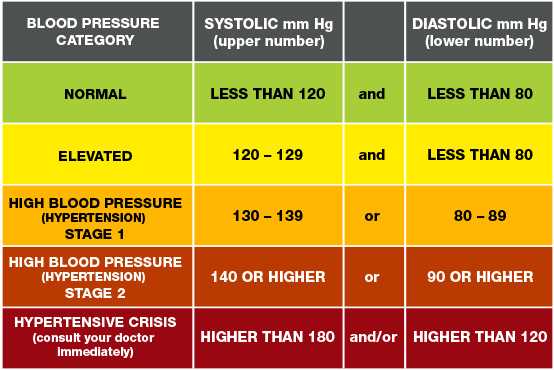Blood pressure is the force of blood pushing against the walls of your arteries. It is measured in two numbers: systolic blood pressure and diastolic blood pressure. Systolic blood pressure is the pressure when your heart beats, and diastolic blood pressure is the pressure when your heart is at rest.
Normal blood pressure is considered to be below 120/80 mmHg. This means that a normal systolic blood pressure is less than 120 mmHg, and a normal diastolic blood pressure is less than 80 mmHg.

Blood pressure readings that are higher than 120/80 mmHg are considered to be high blood pressure. High blood pressure is a major risk factor for heart disease, stroke, and other health problems.
There are a number of factors that can affect your blood pressure, including:
- Age: Blood pressure tends to increase as you get older.
- Family history: If you have a family history of high blood pressure, you are more likely to develop high blood pressure yourself.
- Race: African Americans are more likely to develop high blood pressure than Caucasians.
- Weight: Obesity is a major risk factor for high blood pressure.
- Physical activity: Regular physical activity can help to lower blood pressure.
- Diet: A healthy diet that is low in salt and saturated fat can help to lower blood pressure.
- Stress: Stress can temporarily raise blood pressure.
If you have high blood pressure, there are a number of things you can do to lower it, including:
- Losing weight: If you are overweight or obese, losing even a small amount of weight can help to lower blood pressure.
- Eating a healthy diet: A healthy diet that is low in salt and saturated fat can help to lower blood pressure.
- Getting regular physical activity: Regular physical activity can help to lower blood pressure.
- Managing stress: Stress can temporarily raise blood pressure. There are a number of things you can do to manage stress, such as relaxation techniques, meditation, and yoga.
- Taking medication: If lifestyle changes are not enough to lower your blood pressure, your doctor may prescribe medication.
It is important to monitor your blood pressure regularly if you have high blood pressure. This will help you to make sure that your blood pressure is under control and that you are taking the right steps to lower it.
Here are some additional tips for maintaining normal blood pressure:
- Get regular checkups: Your doctor can check your blood pressure and make sure that it is under control.
- Know your numbers: It is important to know your normal blood pressure readings so that you can track your progress and make sure that your blood pressure is staying within a healthy range.
- Take your blood pressure at home: If you have high blood pressure, your doctor may recommend that you take your blood pressure at home. This will help you to track your blood pressure more frequently and make sure that it is under control.
- Make lifestyle changes: There are a number of lifestyle changes that you can make to help lower your blood pressure, such as losing weight, eating a healthy diet, getting regular physical activity, and managing stress.
- Take medication: If lifestyle changes are not enough to lower your blood pressure, your doctor may prescribe medication.
Normal blood pressure is important for your overall health. By following these tips, you can help to maintain normal blood pressure and reduce your risk of developing heart disease, stroke, and other health problems.